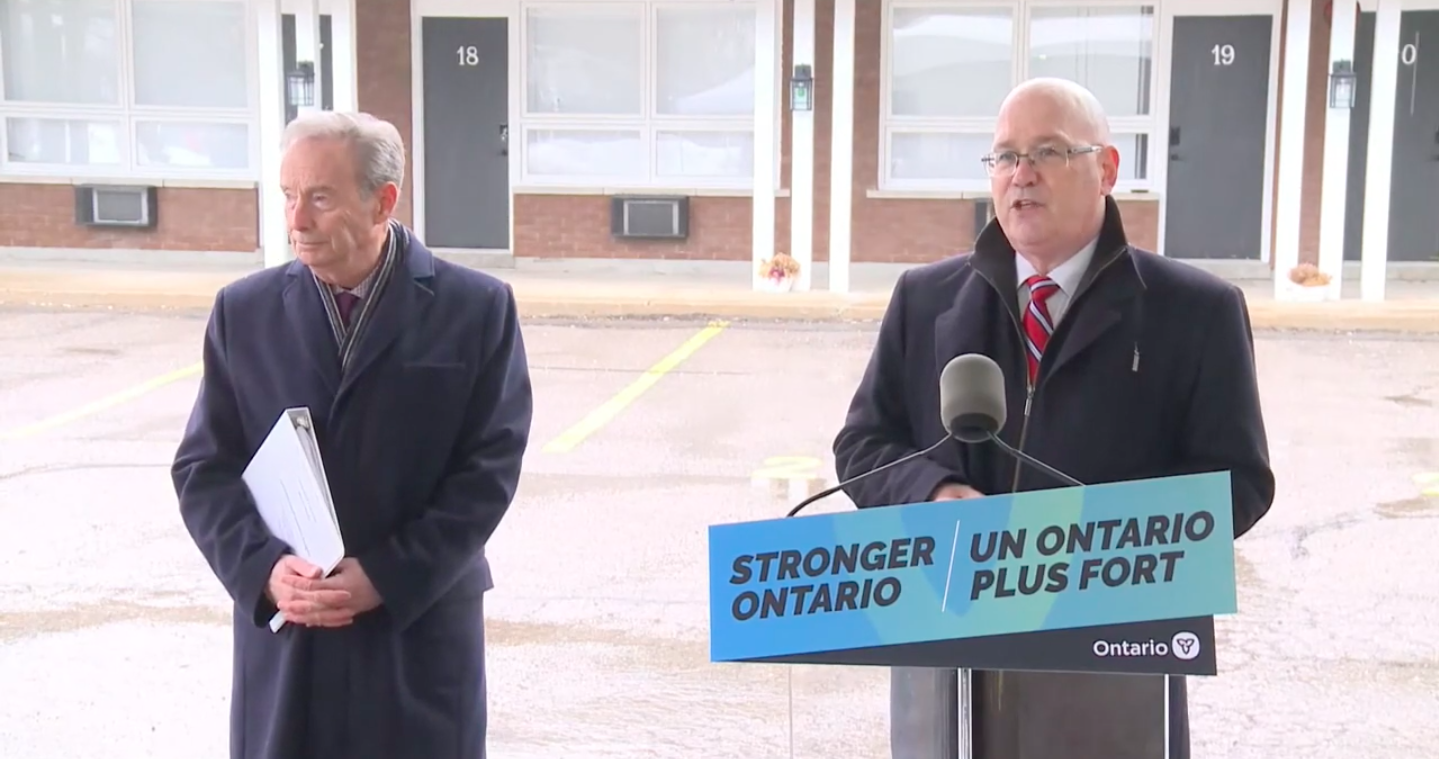New program aims to prevent homelessness in Whitby
Published March 7, 2022 at 3:14 pm

A new “single, streamlined” Homelessness Prevention Program is coming to Ontario in next month as announced today in Whitby.
The Town’s MPP Lorne Coe, Minister of Municipal Affairs and Housing Steve Clark, Regional Chair John Henry and Mohammed Ali, the Vice-President of Muslim Affairs Canada came to the Muslim Welfare Centre to announce the program designed to consolidate existing services.
The program will combine three existing homelessness programs; the Community Homelessness Prevention Initiative, Home for Good, and the Strong Communities Rent Supplement Program. Clark described this existing patchwork of programs as, “fragmented. It was overly complex and it was underfunded.”
As a result, Clark said that municipalities have had to “focus on paperwork and administration rather than protecting” their unsheltered populations and providing the necessary supports.
“It didn’t allow service managers the flexibility to ensure the the right services are available to the people who need them the most,” he said, describing the system as inefficient and unsustainable.
“The Province’s short supply of housing impacts all Ontarians,” Clark said, “No matter what your background or your budget. As our government continues to work on increasing housing supply, we know that it’s so important to protect our most vulnerable Ontarians.”
In pursuit of this goal the Province designed a new Homelessness Prevention Program supported by an additional $25 million investment. Also announced was a $6.7 million increase to Ontario’s Indigenous Supportive Housing program, bringing the funding for that program to $30 million.
“Our government recognizes how important culturally appropriate housing is for Indigenous communities, and how critical these services are to improving the physical, mental and social well-being of Indigenous people across Ontario,” said Greg Rickford, Minister of Indigenous Affairs.
The funding increase to these programs will bring the province’s total yearly investment in such initiatives up to nearly $464 million.
By consolidating the existing programs Ontario aims to allow service managers, like Durham Region, greater flexibility in allocating the funding to “where it’s needed most,” per Clark.
The Province has partnered with the Canadian Alliance to End Homelessness (CAEH) to create a new by-name list of people eligible for the program’s supports. By-name lists are registries of people experiencing homelessness used to track the efficacy of housing programs.
The Regional by-name list for example is used to assign people to projects like the Oshawa Micro-homes or Beaverton Supportive Housing Project.
Regional programs have seen a great deal of success with high “outflow” from the by-name list into housing. However, steady rates of people becoming homeless or migrating to Durham have kept the list at a steady number.
Regional Chair John Henry said Durham’s shelter programs settled 1,323 people last year, as over 3000 people received eviction prevention supports and 1778 were helped to find housing .
Ontario is also sending $600,000 to the CAEH to fund training for service administrators as the HPP rolls out. “With today’s announcement, Ontario is taking critical steps toward ending homelessness.” said CAEH President and CEO Tim Richter. “This is really smart policy that puts Ontario on the cutting edge of provincial responses to homelessness in Canada.”
“Instead of looking at the number, we want our service managers to to be able to use these by-name lists to really tailor a program to that meets those individuals’ needs,” Clark said.
All 47 service managers in the province have established by-name lists for this new program. “We’re seeing great progress,” said Clark.
According to Clark, Ontario has been negotiating with the federal government and Housing Minister Ahmed Hussen for an additional $490 million in “urgent dollars” the province feels it is being underfunded by.
“Unfortunately our National Housing Strategy negotiations…have not gone well to date,” Clark said, “they’ve been ignoring our calls for more dollars. I have to be honest with people today. I’m frustrated.”
Other Provinces have not had the difficulty Clark describes. Hussen and Quebec Minister of Housing Andree LaForest announced their deal in September 2020 after three years of negotiation.
The National Housing Strategy, first announced in 2017, would see a $55 billion investment in housing initiatives across the country with the goal of cutting homelessness in half over ten years.
Durham has a higher goal of ending homelessness in the Region by 2024. Henry believes this new program will bring that goal closer saying, “Everyone deserves a safe place to call home; it is a basic human right. This funding from the Province of Ontario will support critical homelessness prevention and housing services to help ensure Durham Region remains a healthy, safe and prosperous place.”
insauga's Editorial Standards and Policies advertising





